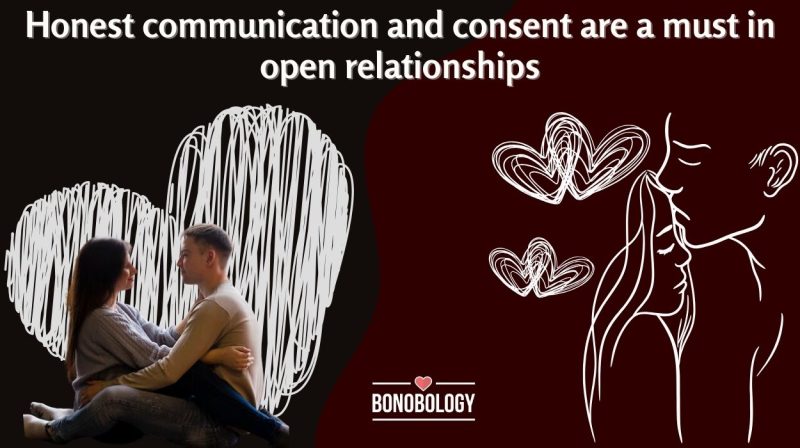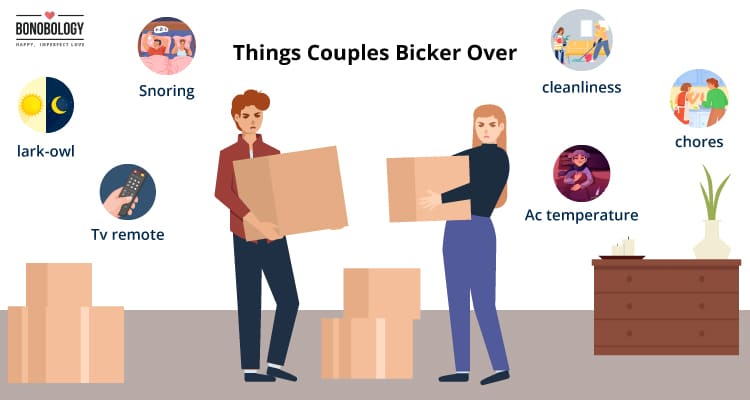So, you’ve been in a relationship for the last couple of years and you feel like things are getting serious. You want to take your relationship to the next phase but are not ready for marriage yet. Living together seems like a logical step. But, have you considered the disadvantages of living together?
The ‘married’ tag isn’t something that you can cope with yet. We understand that. It entails too much responsibility and far more change in lifestyle than you would like. You’re convinced that what’s best for you and your partner right now is alive-in relationship. But remember, there are problems in live-in relationships, too.
Without sounding too much like wet blankets in your nest of love, allow us to tell you about some disadvantages of living together.
What Is Meant By a Live-In Relationship?
Table of Contents
A live-in relationship is when you and your partner decide to share living space, but without getting married. So, you could be sharing rent, finances, planning an entire physical, sexual and emotional life together, but no wedding bells yet. Our expert Madhuri Y educates us on how a live-in relationship is different from a marriage.
She says, “They are very similar when it comes to the aspect of sharing space between two people. The difference lies in the involvement of your social circle in the relationship, especially interaction and socializing with the family. Whether you perceive family as a binding force or a divisive one; their involvement still remains minimal.”
“Also in a live-in relationship you might be sharing the same roof and even have a joint bank account but when it comes to legal rights partners don’t have all that much, especially when it comes to inheritance rights,” Madhuri adds.

The Disadvantages Of Live-In Relationships
Do you think a live-in relationship is an absolute walk in the park? Think you’ve seen couples on-screen make it look lovely and utterly romantic. Are you fantasizing about being Nick and Jess on New Girl? Or maybe Will and Grace, except you’re both still attracted towards each other? Maybe you think you’re Monica and Chandler on Friends and someday one of you will propose in a room full of candles.
But isn’t it likely that it involves more than what they show in movies and TV? Of course, it does! After all, Will and Grace are technically an ex-couple, and the other two couples went on to get married.
While it may seem easy and smooth, a live-in relationship comes with its own set of disadvantages. Read on to find out what these are.
Related Reading:7 Golden Rules For A Live-In Relationship
1. Lack of commitment
This is a major debate against live-in relationships where its biggest advantage is also its biggest disadvantage.
Laura and Ken had been living together for a few months, and Ken was uneasy about how easily Laura seemed to dismiss their relationship. Any time they had a disagreement, or even if he attempted to talk about the future, she would either walk off, or shrug as though it wasn’t important. Ken could not help but think she had commitment issues.
Flexibility is the hallmark of a live-in relationship, but sometimes it can be too flexible. Hence it may not demand a serious commitment from both sides. Walking out of a live-in relationship can be as easy as packing your bags and booking an Uber. This is why even the slightest disagreement may lead to one of the partners heading for the exit.

2. Takes the charm out of marriage
If one partner has been dreaming of an intimate, beach wedding, but the other isn’t keen, it’s possible their live-in relationship has taken the charm out of marriage.
Marriage has little to offer to couples who have already been living together for a few years. After all, if you’ve already got a home together, a shared routine and bank balance, why get into marriage at all, when it’s basically the same thing. This lack of novelty is one of the major disadvantages of a live-in relationship.
This can take an unfortunate turn if one partner still wants to get married, but the other doesn’t. Imagine talking to your partner about marriage, having to convince someone you love and who you live with that marriage could be better and even more beautiful, and their reaction is, ‘Meh!’
3. Social censure
We know it’s a brave new world and how you conduct your love life should be your business and yours alone. Unfortunately, the world hasn’t quite caught up. There are many still countries and societies where a live-in relationship is taboo. This is one of the negative effects of a live-in relationship.
Related Reading: Her Live-In Partner Sexually Abused Her Daughter And Then…
For Jean and Ashton, it became an issue. Their families asked pointed questions about when they might get married. When they looked for an apartment, they were turned away several times. It caused huge strain in their relationship even after they moved in together.
It’s easy to say ‘ignore them’ or ‘it doesn’t matter.’ But, like it or not, we are all part of a larger society, and what people say and think affects our lives. If you and your partner are constantly under the scrutiny of critical neighbors and family members, it will make your relationship strained and uncomfortable.

4. Breaking up is harder
Breakups are hard enough when you live separately. When you’ve shared living space, daily morning coffee and maybe even a wardrobe, breaking up is doubly difficult. You’re not just separating two individuals, but two entire lives.
Also, when you decided to live together, you took a leap of faith and made plenty of changes in your respective lives. Maybe you have a joint bank account, hell, maybe you even bought a house together. When so many aspects of your lives have come together, unravelling them is painful and tough.
And let’s face it, if marriages can end in divorces, live-in relationships can end too.
Related Reading: How To Break Up With Someone You Live With
5. Lack of support
This is another major debate against live-in relationships. Family and friends are a big part of any romantic relationship, even if you wish they weren’t. Meeting your partner’s family, seeing how they treat their parents etc gives you major insight into who they are.
Family, friends and neighbors are also a huge source of support and comfort. But if the community as a whole disapproves of your live-in relationship, they probably won’t turn up when you need them.
For Jenna and Tim, this came as a major shock. Jenna fell ill one night and had to be rushed to hospital. Tim called both sets of parents, but neither of them were aware that Jenna and Tim were living together. When they showed up at the hospital and realized, there was a huge showdown. It took many months before their parents came to terms with their live-in status, and even then, there was a chill in the air.
Marriage legally binds you to your respective families but when you are living together, in case of emergencies or financial need, you often find yourselves with no one to turn to.

6. You get to know your partner’s ‘other’ side
Maybe all this time you were convinced your partner was a sweet, dimpled darling who can do no wrong. Then you move in with them and see them as the living, breathing, alarmingly human mess we all are.
Living with a person teaches you a lot about them. Dating a person and sharing the same space with them are very different things and the latter comes with its own unique set of challenges.
He always leaves the toilet seat up. She puts so much spice in the food he can’t eat it. He finds out her eyelashes are fake. Mind you, all of this happens in a marriage too, of course, but hey, there you have to go to an actual courthouse to get out of it.
7. Trust issues
You love your partner and crave something more than conventional dating. You want to see them every day and don’t mind sharing a space with them. You don’t want to spend a moment without your s/o but at the same time, you’re not ready for marriage.
It’s even possible that you believe in love without labels but don’t want that to hold you back. There are countless scenarios in which live-in relationships can work wonders! Many couples swear by it, and why wouldn’t they? Living with the love of your life does come with challenges, yes. But, it is also the greatest feeling ever.
But another problem with live-in relationships is it comes with its set of insecurities. Since you are not married, you could constantly doubt if the relationship will go to the next level. You tend to become clingy and often in live-in relationships people end up spying on their partners.
8. Will the kids be all right?
This is a real doozy. It’s entirely possible that you’re happily living together, and then you plan to have kids, but without getting married. Or there’s an unplanned pregnancy and you decide you want children with your partner.

Not to burst your happy baby bubble, but cohabiting couples don’t have a stellar track record with children. A survey shows that two-thirds of cohabiting parents break up before their children turn 12 as compared to a quarter of married parents.
The fragility of couples living together, as opposed to married couples is rarely the healthiest environment to raise a child. While it’s certainly possible to love and cherish your kids even without being married, a sense of stability is crucial for children, and cohabitation may not be ideal.
Related Reading: How To Talk To Your Kids About Divorce
9. Legal issues
U.S. law doesn’t lend a lot of support for couples in live-in relationships. Couples are encouraged to draw up their own contracts and agreements before buying property etc. to decide how they want to divide any major assets.
In other words, before you make any decisions, learn to draw up your own pre-living-together agreements. If you’re getting a house together, who would move out in the event of a breakup? Whose name is on the lease? If one partner is earning less, are they eligible for an allowance in case of a breakup?
These are hard questions to deal with when you’re blissfully planning your dream living-together home. But, the law isn’t going to be of much help unless you’re married, so you’ll have to safeguard your own interests, and maybe each other’s.
We’ve established that living together is no picnic. So, ensure that you take a well thought-out decision. Pursuing a live-in relationship is a major step for a couple. You may not be marrying the person, but you are still going to share a life with them. Hence, this decision should be taken with the utmost care. Getting carried away with emotions and rushing into things can be bad for you in the long run.
Good luck!
FAQS
Living together might seem like a logical and romantic step in a relationship, but there are disadvantages. There could be trust issues, social stigma, financial worries and so on. These are some of the negative effects of a live-in relationship, and need to be weighed carefully before you take the actual step of moving in together.
When you live with your partner, you see them in their immediate, everyday environment. You get to know what they are like first thing in the morning, or how they react if they’ve run out of coffee. In a live-in relationship, you get to know your partner on a more intimate level – their messy, grouchy, most authentic selves.
Marriage Vs Live-In Relationships: Everything You Need To Know
Please Don’t Call Her Selfish If She Doesn’t Want To Live With Her In-Laws
Your contribution does not constitute a charitable donation. It will allow Bonobology to continue bringing you new and up-to-date information in our pursuit of helping anyone in the world to learn how to do anything.






















Featured
My Wife Wants Open Marriage: 17 Tips To Navigate
Open Relationship Dating: What It Is & Why It Works
13 Glaring Red Flags Before Moving In Together You Should Never Ignore
Polyamory Vs Open Relationship – 8 Key Differences (And Some Similarities)
Polyamorous Vs Polygamy – Meaning, Differences, And Tips
How To Make A Polyamorous Marriage Work? 6 Expert Tips
Are You Moving In Together? Checklist From An Expert
21 Expert Tips For Couples Moving In Together
Non-Monogamous Relationship: Meaning, Types, Benefits
Decorating Tips For Couples Moving In Together
How Soon Is Too Soon To Move In Together?
Cohabitation – Everything You Need To Know About It
Does A Friends With Benefits Relationship Actually Work?
Tips To Ease Moving In With Your Boyfriend
10 Open Relationship Rules That Have To Be Followed To Make It Work
Does Living Together Before Marriage Mean You Are Ready For The Wedding?
Marriage VS Live-In Relationship: Everything You Wanted To Know
5 Things To Consider Before Beginning A Polyamorous Relationship
7 Creative Ways To Ask Your Girlfriend To Move In With You
My friend invited me to his house and I fell in love with his wife